北师大版高一英语上Unit1-2知识点
北师大版高一英语必修1_Unit2_Lesson2_重难点词汇详解

Unit2 Lesson2 重难点词汇详解1. fight for sth. 为……而战斗教材原文fought for the rights of black people in the USA为美国黑人的权利而战经典例句①He died fighting for the country.他为国战死。
②The firm has to fight off a lot of competition to win the contract.这家公司得击败许多对手才能赢得这份合同。
③The young men are determined to fight it out.这些年轻人决心斗争到底。
④I fight back tears each time I see your empty house next door.我每次看到隔壁你住过的空房子,都强忍住眼泪。
(each time相当于连词,引导时间状语从句)⑤The ancient way to settle a quarrel was to choose a leader from each side and let them fight it out.古代解决争端的办法是双方各选一名领导人,让他们一决雌雄。
(第一个不定式作定语,修饰way;第二个不定式作表语)2. found v. 创建;创办教材原文led the 1911 revolution and founded the first Republic of China 领导了辛亥革命,建立了中华民国经典例句①He founded the first Republic of China after many years' fighting.经过多年的斗争之后,他建立了中华民国。
②His theory is founded on facts and experiments.他的理论建立在事实和实验的基础上。
北师大高中英语第一模块(1-3单元期末复习知识点)
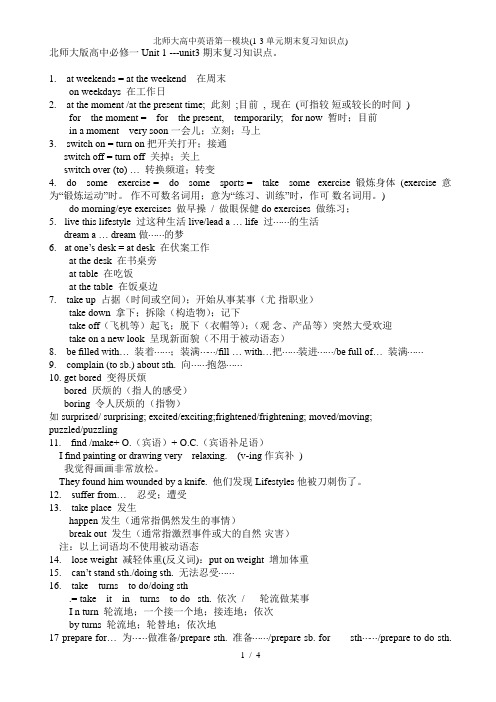
北师大版高中必修一Unit 1 ---unit3期末复习知识点。
1. at weekends = at the weekend 在周末on weekdays 在工作日2. at the moment /at the present time; 此刻;目前, 现在(可指较短或较长的时间)for the moment = for the present, temporarily; for now 暂时;目前in a moment very soon一会儿;立刻;马上3. switch on = turn on把开关打开;接通switch off = turn off 关掉;关上switch over (to) … 转换频道;转变4. do some exercise = do some sports = take some exercise 锻炼身体(exercise 意为“锻炼运动”时。
作不可数名词用;意为“练习、训练”时,作可数名词用。
) do morning/eye exercises 做早操/ 做眼保健do exercises 做练习;5.live this lifestyle 过这种生活live/lead a … life 过⋯⋯的生活dream a … dream做⋯⋯的梦6.at one’s desk = at desk 在伏案工作at the desk 在书桌旁at table 在吃饭at the table 在饭桌边7. take up 占据(时间或空间);开始从事某事(尤指职业)take down 拿下;拆除(构造物);记下take off(飞机等)起飞;脱下(衣帽等);(观念、产品等)突然大受欢迎take on a new look 呈现新面貌(不用于被动语态)8. be filled with… 装着⋯⋯;装满⋯⋯/fill … with…把⋯⋯装进⋯⋯/be full of…装满⋯⋯9. complain (to sb.) about sth. 向⋯⋯抱怨⋯⋯10. get bored 变得厌烦bored 厌烦的(指人的感受)boring 令人厌烦的(指物)如surprised/ surprising; excited/exciting;frightened/frightening; moved/moving;puzzled/puzzling11. find /make+ O.(宾语)+ O.C.(宾语补足语)I find painting or drawing very relaxing. (v-ing 作宾补)我觉得画画非常放松。
北师大版高中英语必修第一册 Unit 1、2 语言知识点总结

北师大版高中英语必修第一册Unit 1、2语言知识点总结UNIT 1LIFE CHOICES1.Stress(1)stress n.压力;忧虑;紧张vt.强调;加强lay/place/put stress on sth=stress sth强调某事物;给某物压力under the stress of在……压力下;为……所迫be under stress处于压力之下put sb under great stress使某人感到沉重的压力(2)stress the importance of...强调……的重要性2.challenge n.挑战;具有挑战性的事物vt.向……挑战(1)challenge sb to sth向某人挑战,和某人比试challenge sb to do sth挑战某人做某事(2)accept a challenge 应战face an challenge 面临挑战give a challenge挑战3.Differ(1)differ from...与……不同/有区别differ in...在……方面不同differ with sb on/about/over sth与某人在某事上持不同(看法) (2)different adj.不同的be different from...与……不同(3)difference n.不同,差别make a difference (to...)(对……)有作用或影响make no difference (to...)(对……)没有影响tell the difference between A and B指出A与B的不同4.ahead of schedule提前on schedule准时;按时间表be scheduled for预定;安排be scheduled to do...预定做…5.(1)in expectation期望着;意料之中have expectations of (对……)抱有期望beyond expectation/out of expectation出乎意料expect v.期待。
北师大版高中英语必修第一册 Unit 1、2 语言知识点总结

北师大版高中英语必修第一册Unit 1、2语言知识点总结UNIT 1LIFE CHOICES1.Stress(1)stress n.压力;忧虑;紧张vt.强调;加强lay/place/put stress on sth=stress sth强调某事物;给某物压力under the stress of在……压力下;为……所迫be under stress处于压力之下put sb under great stress使某人感到沉重的压力(2)stress the importance of...强调……的重要性2.challenge n.挑战;具有挑战性的事物vt.向……挑战(1)challenge sb to sth向某人挑战,和某人比试challenge sb to do sth挑战某人做某事(2)accept a challenge 应战face an challenge 面临挑战give a challenge挑战3.Differ(1)differ from...与……不同/有区别differ in...在……方面不同differ with sb on/about/over sth与某人在某事上持不同(看法) (2)different adj.不同的be different from...与……不同(3)difference n.不同,差别make a difference (to...)(对……)有作用或影响make no difference (to...)(对……)没有影响tell the difference between A and B指出A与B的不同4.ahead of schedule提前on schedule准时;按时间表be scheduled for预定;安排be scheduled to do...预定做…5.(1)in expectation期望着;意料之中have expectations of (对……)抱有期望beyond expectation/out of expectation出乎意料expect v.期待(2)expect sth (from sb)期望(从某人处)得到某物expect to do sth期待做某事expect sb to do sth期待某人做某事expect too much of sb对某人期望过高6.(1)confident adj.对……有信心be confident about/of (doing) sth对(做)某事有把握be confident that...确信;肯定;自信(2)have confidence in对……有信心with confidence肯定地;有把握地(3)confidently adv.自信地7.(1)recover from...从……恢复recover one’s costs收回成本recover oneself清醒过来(2)recovery n.恢复健康,复原;重获,复得make a full recovery完全康复8.(1)vary v.呈现不同vary in sth在某方面不同vary with sth随……而变化vary between...and...由……到……情况不等vary from...to...改变,变动,变化(2)variety n.变化;种类;多样性a variety of=varieties of许多;各种各样的9.convenience n.方便;便利;便利的事物at one’s convenience在某人方便时for convenience为方便起见for the convenience of为了方便……if convenient如果方便的话It is convenient for sb to do...对某人来说做某事很方便【温馨提示】(1)convenient作表语时,不能用表示人的名词或代词作主语,多用于It is convenient for sb to do...这一句型中。
最新北师大英语必修一-全套知识点
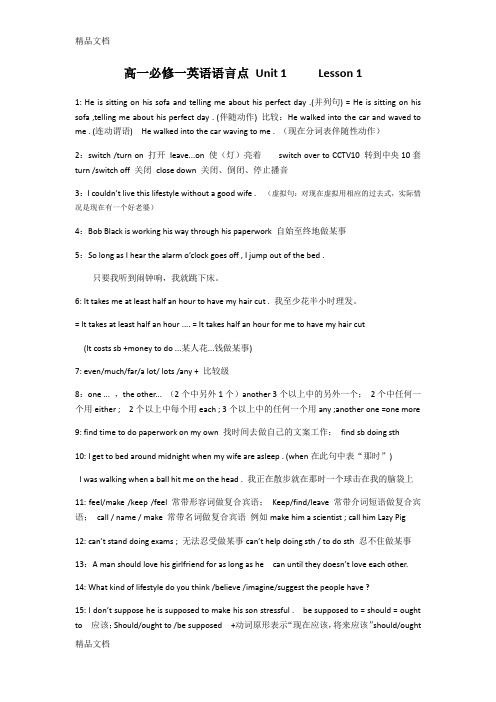
高一必修一英语语言点Unit 1 Lesson 11: He is sitting on his sofa and telling me about his perfect day .(并列句) = He is sitting on his sofa ,telling me about his perfect day . (伴随动作) 比较:He walked into the car and waved to me . (连动谓语) He walked into the car waving to me . (现在分词表伴随性动作)2:switch /turn on 打开leave...on 使(灯)亮着switch over to CCTV10 转到中央10套turn /switch off 关闭close down 关闭、倒闭、停止播音3:I couldn’t live this lifestyle without a good wife . (虚拟句:对现在虚拟用相应的过去式,实际情况是现在有一个好老婆)4:Bob Black is working his way through his paperwork 自始至终地做某事5:So long as I hear the alarm o’clock goes off , I jump out of the bed .只要我听到闹钟响,我就跳下床。
6: It takes me at least half an hour to have my hair cut . 我至少花半小时理发。
= It takes at least half an hour .... = It takes half an hour for me to have my hair cut(It costs sb +money to do ...某人花...钱做某事)7: even/much/far/a lot/ lots /any + 比较级8:one ... ,the other... (2个中另外1个)another 3个以上中的另外一个;2个中任何一个用either ; 2个以上中每个用each ; 3个以上中的任何一个用any ;another one =one more9: find time to do paperwork on my own 找时间去做自己的文案工作;find sb doing sth10: I get to bed around midnight when my wife are asleep . (when在此句中表“那时”)I was walking when a ball hit me on the head . 我正在散步就在那时一个球击在我的脑袋上11: feel/make /keep /feel 常带形容词做复合宾语;Keep/find/leave 常带介词短语做复合宾语;call / name / make 常带名词做复合宾语例如make him a scientist ; call him Lazy Pig12: can’t stand doing exams ; 无法忍受做某事can’t help doing sth / to do sth 忍不住做某事13:A man should love his girlfriend for as long as he can until they doesn’t love each other.14: What kind of lifestyle do you think /believe /imagine/suggest the people have ?15: I don’t suppose he is supposed to make his son stressful . be supposed to = should = ought to 应该;Should/ought to /be supposed +动词原形表示“现在应该,将来应该”should/oughtto /be supposed +have done 表示过去应该做某事16:complain to sb about sth /doing sth = make a complaint to sb about ... 向某人抱怨/投诉某事、向某人抱怨/投诉做某事17: go off (爆竹、铃)响;(灯)熄灭= go out;离开;停止运行be off to = leave for 动身前往18:work one’s way through ... 自始至终做某事19:take up 占据(时间、空间);开始对... 感兴趣;拿起take up doing sth 反give up doing 20:be filled with = be full of 装满....; fill out / fill in the form 填好表格、填入表格21: urgent matters 紧急事务;be in urgent need of 急需.... urge sb to do sth 力劝某人做.... 22:be bored with 对....烦;be tired of 厌倦....23: besides = as well as = in addition to = apart from ;除了... (加进来的概念);except= but = other than = apart from 除了(减去的概念);except for 修正前面的整体定论,排除不同类24:seldom/rarely 很少hardly 几乎不;25: What do you think /believe /imagine /expect/suggest/suppose he should do tomorrow ?Think等词充当插入语放在特殊疑问词后,插入语后用陈述语序26 以ed为后缀的形容词除了可以修饰人还可以修饰appearance 外观(外表);voice /expression 表情/look面容、相貌atmosphere 气氛,氛围sound 声音高一必修一英语语言点Unit 1 Lesson 21: find / think /keep/make ... 后跟形容词做宾补;keep/find /leave ...+ 介词词组做宾补;call /name/make ... 后跟名词做宾补2:It is not good for you not to have breakfast .你不吃早餐是不好的= Your not having breakfast is not goodIt is not good of us not to make room for the old . 你不给老人让座不好。
高一英语北师大新版书单词知识点
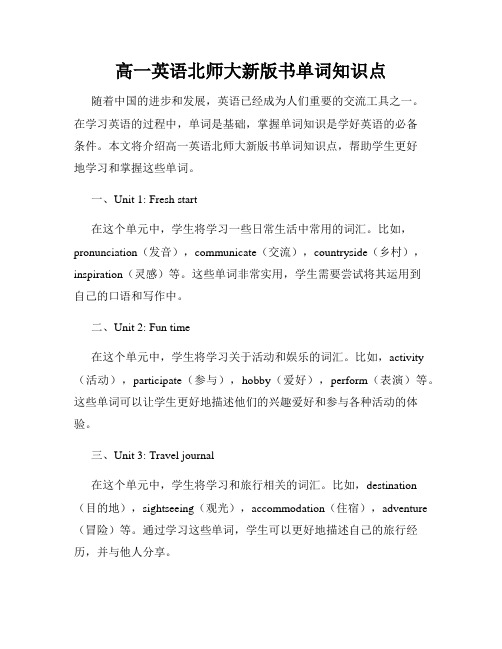
高一英语北师大新版书单词知识点随着中国的进步和发展,英语已经成为人们重要的交流工具之一。
在学习英语的过程中,单词是基础,掌握单词知识是学好英语的必备条件。
本文将介绍高一英语北师大新版书单词知识点,帮助学生更好地学习和掌握这些单词。
一、Unit 1: Fresh start在这个单元中,学生将学习一些日常生活中常用的词汇。
比如,pronunciation(发音),communicate(交流),countryside(乡村),inspiration(灵感)等。
这些单词非常实用,学生需要尝试将其运用到自己的口语和写作中。
二、Unit 2: Fun time在这个单元中,学生将学习关于活动和娱乐的词汇。
比如,activity (活动),participate(参与),hobby(爱好),perform(表演)等。
这些单词可以让学生更好地描述他们的兴趣爱好和参与各种活动的体验。
三、Unit 3: Travel journal在这个单元中,学生将学习和旅行相关的词汇。
比如,destination (目的地),sightseeing(观光),accommodation(住宿),adventure (冒险)等。
通过学习这些单词,学生可以更好地描述自己的旅行经历,并与他人分享。
四、Unit 4: Science world在这个单元中,学生将学习一些科学和技术方面的词汇。
比如,experiment(实验),research(科研),technology(技术),discover (发现)等。
这些单词可以帮助学生更好地理解科学知识,并能够进行相关的研究和讨论。
五、Unit 5: Our world在这个单元中,学生将学习关于环境和保护的词汇。
比如,environment(环境),pollution(污染),recycle(回收利用),awareness(意识)等。
这些单词非常重要,学生需要努力保护环境,并提高对环境问题的认识意识。
北师大版英语高一必修一unit1lesson2教材讲解+同步练习
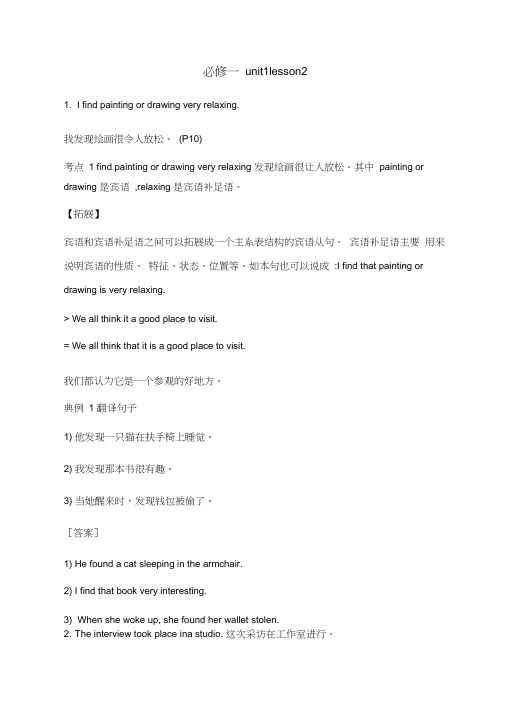
必修一unit1lesson21. I find painting or drawing very relaxing.我发现绘画很令人放松。
(P10)考点 1 find painting or drawing very relaxing 发现绘画很让人放松。
其中painting or drawing 是宾语,relaxing 是宾语补足语。
【拓展】宾语和宾语补足语之间可以拓展成一个主系表结构的宾语从句。
宾语补足语主要用来说明宾语的性质、特征、状态、位置等。
如本句也可以说成:I find that painting or drawing is very relaxing.> We all think it a good place to visit.= We all think that it is a good place to visit.我们都认为它是一个参观的好地方。
典例 1 翻译句子1) 他发现一只猫在扶手椅上睡觉。
2) 我发现那本书很有趣。
3) 当她醒来时,发现钱包被偷了。
[答案]1) He found a cat sleeping in the armchair.2) I find that book very interesting.3) When she woke up, she found her wallet stolen.2. The interview took place ina studio. 这次采访在工作室进行。
考点 2 take place发生;举行。
不能用于被动语态。
> Great changes have taken place in my hometown.我的家乡发生了巨大的变化。
[ 易混辨析]take place, happen, occurThe 29th Olympic Games took place in Beijing.第29 届奥运会在北京举行Maybe something unexpected happened. 也许一些未曾料到的事发生了。
北师大版高一英语Unit1-4单元知识点归纳

Unit1 知识点归纳一、短语1. live this lifestyle 过这种生活方式2. go off (闹钟等)响3.suffer from 忍受,遭受4.be filled with充满着5.graduate from从…中毕业6.be fond of doing sth 喜欢做某事7.can’t stand doing不能忍受做某事8. complain about sth抱怨做事9.win support from sb 赢得某人支持10. be free of sth 免于,摆脱11.make sure that+句子确保12.by distance learning通过远程学习13.take up sth 占据(时间、空间)14. switch over to转换到…频道15.get chang ed换衣服16. take…for a walk 带…去散步17.as soon as 一….就18. have breakfast 吃早餐20.be ready for 为…做好准备20. get bored 变的厌烦二、词性转换1.peaceful (adj.)和平的;peace(n.)和平2. relaxing (adj.)放松的;relax(vt.)放松3.stress (n.)压力;stressful(adj.)有压力的4. complain(vt.)抱怨;complaint(n.)抱怨5. person(n.)人;personal (adj.)个人的6. reduce减少;reduction(n.)减少7. organize(vt.)组织organization(n.)组织8.prefer (vt.)更喜欢; preference(n.)偏爱9. grduate(vt.)毕业;graduation(n.)毕业10. design(vt.)设计designer(n.)设计者11.advertise(vt.)登广告; advertisement(n.)广告12.sick(adj.)有病的;sickness病13. crowd(n.)人群;crowded(adj.) 拥挤的14. present(vt.)展现presentation(n.)展现15. distance(n.)距离;distant (adj.)遥远的16. cycle(vt.)骑自行车;cycling(n.)骑自行车三、重点句型1. Of course, I couldn’t live this lifestyle without a good wife.当然,没有一个好妻子我不可能按这种生活方式生活。
,北师大高一英语知识点
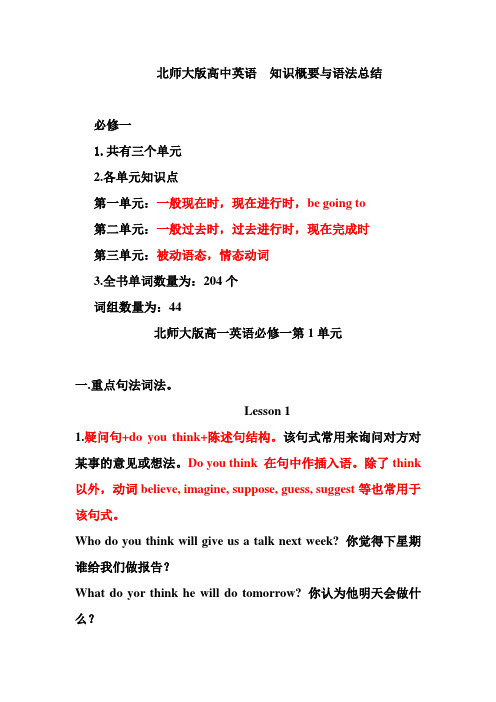
北师大版高中英语知识概要与语法总结必修一1.共有三个单元2.各单元知识点第一单元:一般现在时,现在进行时,be going to第二单元:一般过去时,过去进行时,现在完成时第三单元:被动语态,情态动词3.全书单词数量为:204个词组数量为:44北师大版高一英语必修一第1单元一.重点句法词法。
Lesson 11.疑问句+do you think+陈述句结构。
该句式常用来询问对方对某事的意见或想法。
Do you think 在句中作插入语。
除了think 以外,动词believe, imagine, suppose, guess, suggest等也常用于该句式。
Who do you think will give us a talk next week? 你觉得下星期谁给我们做报告?What do yor think he will do tomorrow? 你认为他明天会做什么?2.I think…but…常用来表达先是肯定然后转折。
I thought he should come by air, but he preferred to drive is new car.我以为他会坐飞机来,但他更愿意驾驶他的新车。
3.relaxing. Relaxing 是由及物动词relax+ing构成的形容词,意思是“轻松的,令人放松的”。
Boring和relaxing的构词法相同,意思是“令人厌烦的,单调乏味的”。
Relaxed“放松的”和 bored“无聊的”常用来修饰人;而relaxing 和boring均表示“令人……”,常修饰物。
Mary felt relaxed to make a relaxing conversation with a good friend, while Peter got bored with a lot of boring homework to do.和一个好朋友的轻松交谈让玛丽感到很放松,而要做很多无聊的作业使彼得感到很厌烦。
,北师大高一英语知识点
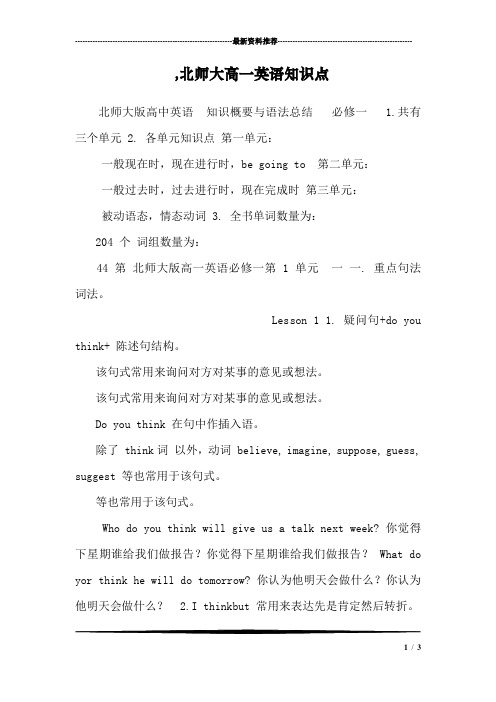
---------------------------------------------------------------最新资料推荐------------------------------------------------------,北师大高一英语知识点北师大版高中英语知识概要与语法总结必修一 1.共有三个单元 2. 各单元知识点第一单元:一般现在时,现在进行时,be going to 第二单元:一般过去时,过去进行时,现在完成时第三单元:被动语态,情态动词 3. 全书单词数量为:204 个词组数量为:44 第北师大版高一英语必修一第 1 单元一一. 重点句法词法。
Lesson 1 1. 疑问句+do you think+ 陈述句结构。
该句式常用来询问对方对某事的意见或想法。
该句式常用来询问对方对某事的意见或想法。
Do you think 在句中作插入语。
除了 think词以外,动词 believe, imagine, suppose, guess, suggest 等也常用于该句式。
等也常用于该句式。
Who do you think will give us a talk next week? 你觉得下星期谁给我们做报告?你觉得下星期谁给我们做报告? What do yor think he will do tomorrow? 你认为他明天会做什么?你认为他明天会做什么? 2.I thinkbut 常用来表达先是肯定然后转折。
1 / 3I thought he should come by air, but he preferred to drive is new car. 我以为他会坐飞机来,但他更愿意驾驶他的新车。
3.relaxing. Relaxing 是由及物动词 relax+ing 构成的形容词,意思是轻松的,令人放松的。
构成的形容词,意思是轻松的,令人放松的。
Boring 和和 relaxing 的构词法相同,意思是令人厌烦的,单调乏味的。
北师大版高一英语必修一U2知识点

北师大版高一英语必修一U2知识点------------------------------------------作者xxxx------------------------------------------日期xxxx北师大版高一英语必修一第二单元1.calm adj. 镇定的,沉着的;无风的,无浪的(指天气或海洋)calm sb. / sth. down2.generous adj. 慷慨的,大方的;大量的,丰富的3.character n. 人物;性质;特色;性格;汉字4.atmosphere n. 大气(层);气氛5.let out 释放,让……出来;发出(叫声)lions of 数百万 thousands of 数以千计 hundreds of 数以百计的dozens of 许多 scores of 许多7.冠词/指示代词/不定代词/物主代词+序数词/基数词+一般描述性形容词+大小/长短/形状+年龄/新旧+颜色+国籍/出处+材料+用途/类别+最终修饰的名词口诀:美小圆旧黄,法国木书房。
8.lift off 意为“(飞机等)起飞,(宇宙飞船)升空,发射”,是不及物动词短语。
9.过去分词作定语的用法时态/语态特点;及物动词的过去分词可表示被动和动作已完成;不及物动词的过去分词指表示动作已完成。
10.现在分词作定语的用法;时态/语态特点;可表示主动和动作正在进行/状态的持续;若表示被动和动作正在进行,则要用being done的形式;having done 不作定语。
11.当句子的主语时不定式动作的发出者时,不定式同其所修饰的名词虽有动宾关系,但要用主动形式表示被动含义。
12.with 的复合结构with + 名词/代词+名词with +名词/代词+介词短语with +名词/代词+形容词/副词with +名词/代词+现在分词(可表示主动和动作正在进行)with +名词/代词+过去分词(可表示被动和动作以完成)with + 名词/代词+不定式(表示动作将要发生)13.when=at that time 这时,在那时(表示动作发生的突然性)14.in one’s opinion 在某人看来personally(就自己而言,就我个人而言), as far as I am concerned (在我看来)15.be equal to……与……相等/平等be equal to (doing) sth. 胜任(做)某事16.struggle to do sth. 努力去做某事struggle to one’s feet 挣扎着站起来struggle against 与……作斗争struggle for 为(争取)……而斗争/奋斗struggle with 与……作斗争,和……搏斗17.judge v. 判断,断定;估计,评价judging from/by ……根据……判断18.be content to do sth. 对(做) ……满意be content with sth.19.skill n. 技术,技能,技巧skilled adj. 有技能的,熟练的;需要特殊技能的be skilled in 熟悉/擅长……ed adj. 习惯的,使用过的useful adj. 有用的,有益的uselessness n. 无用,无效pete with/against sb. (for sth. ) (为……)与某人竞争compete in 参加……(比赛/竞赛)compete to do sth. 竞相做某事competitor n. 参赛者;竞争者;选手competition n. 竞赛;比赛competitive adj. 竞争的;有竞争力的22.be keen on sb./sth./doing sth.be keen to do sth. 热心做某事23.be amazed at ……对……感到惊讶be amazed to do sth. 做某事感到惊讶amazing adj.amazement n. 惊愕,惊异in amazement 惊讶地to one’s amazement 使某人感到惊讶的是24.event 重大事件;比赛项目incident 不寻常的活令人不快的事;暴力事件,严重事件,(两国之间的)冲突matter 着重指需要考虑的或需要处理的事情affair 公共事务,政治事务(多用复数形式);私事,个人的事25.look back 回顾,追忆……look back on sth. 回首(往事);回忆,回顾……26.express an interest in……(=show an interest in…) 表示对……的兴趣come to an end 结束;破灭27.on one’s own 单独地,独自地28.promote vt. 促进;推动;提升,晋升;促进29.injure 一般指由于意外或事故受伤hurt 普通用词,既可以肉体上的伤害,也可指精神上的伤害。
北师大版高一英语必修1_Unit2_单元重难点词汇课堂_event

5. A 4-year-old without a boarding pass was found on a Beijing-Shanghai flight before the plane took off on Sunday, causing a delay of nearly five hours. The
即学即练
选词填空。
accident, incident, event, matter, affair
1. The BRICS Summit in Xiamen, East China’s Fujian province will be a good opportunity for member nations to narrow differences and expand cooperation, a
act
reaction = re- + act + -tion (…的行为 / 状态 / 结果)
activist = act + -ive + -ist (…专业人员; …专家;从 事…的人)
activity = act + -ive + -ty (…的状态;…的特性)
即学即练
一、用适当的介词填空。
__i_n_c_i_d_e_n__t_ has again aroused concerns about misbehaving passengers and the
potential security risks they represent.
北师大版高中英语必修1 Unit1_Lesson2_词汇导图语境速记
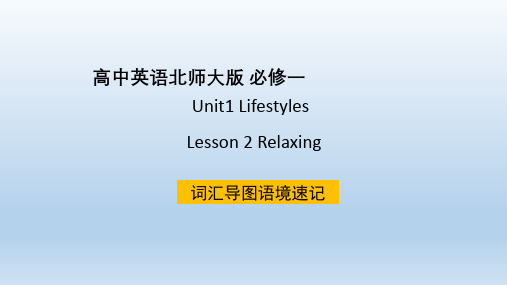
suffer for 为……而受苦
vi. 变差
The old man has suffered enough. He had suffered from cold and hunger when he was young. Now his son's death brings him more suffering. 那个老人受的苦已经够多了。他年轻时遭受过寒冷和饥饿之苦。现在他儿子的去 世给他带来了更多的痛苦。
宁愿……而不愿…… prefer that... 更希望……
漫画助记
I'd prefer it if you are kind enough to write down the words. I'd prefer you to write them on a big piece of paper though you prefer writing in your notebook because I prefer to read it without turning over the paper rather than read it page by page. 如果你足够善意地写下这些单词,我会更喜欢。我宁愿你把它们写在一张大纸上 ,尽管你更喜欢在笔记本上写字,因为我喜欢不用翻页阅读,而不是逐页阅读。
袖手旁观,无动于衷
(sb.) 支持,忠于 随时待命,做好准备
stand for
表示,代表,意指,象征 支持,主张 容忍 (not stand for)
stand up
站起来
(to sth. ) 经得起(检验等) (to sb. ) 抵抗 (for sb. /sth. ) 支持,维护
stand out
- 1、下载文档前请自行甄别文档内容的完整性,平台不提供额外的编辑、内容补充、找答案等附加服务。
- 2、"仅部分预览"的文档,不可在线预览部分如存在完整性等问题,可反馈申请退款(可完整预览的文档不适用该条件!)。
- 3、如文档侵犯您的权益,请联系客服反馈,我们会尽快为您处理(人工客服工作时间:9:00-18:30)。
一二单元知识点1、peaceful adj .和平的,平静的peace (n.和平)+-ful(形容词后缀)(1)反义词:unpeaceful adj. 不平静的,不和平的派生词:peacefully adv. 和平地,平静地(2)同义词辨析:peaceful 与calm这些形容词表明没有激动兴奋或未被打扰。
calm 隐含远离情感冲动之意;peaceful 意指未被打破的镇静。
2、relaxing adj .轻松的,放松的relax(v. 放松)+-ing(形容词后缀)同根词:relaxed意为"感到轻松的"。
有些现在分词和过去分词可用作形容词,现在分词意为"令人……的",其逻辑主语是物;过去分词意为"感到……的",其逻辑主语是人。
类似用法的词有:surprised /surprising; excited/exciting; frightened/frightening; moved/moving;puzzled/puzzling3、suppose的用法1)suppose后接that引导的宾语从句,表示"认为/猜想……"。
2)be supposed to 是个固定词组,意思是"应该,有……的义务"。
如:3)suppose/supposing可以引导条件状语从句,相当于if 的作用。
如:4、prefer vt.更喜欢,宁愿派生词:preferable adj .更可取的,更合意的;preference n.喜爱,偏爱1)请注意prefer的搭配及用法:(1)prefer(doing)sth.to (doing) sth.……相比,更喜欢……如:(2)prefer to do sth. rather than(to) do sth.和做……相比,更喜欢做……如:(3)prefer+that从句。
如:2)prefer sth.to sth.中的to是介词;prefer to do sth. rather than do sth .中to 是动词不定式的符号。
3)prefer to do…rather than do…=would rather do than do…/would do…rather than do…5、switch on=turn on把开关打开;接通switch off=turn off关掉;关上switch over (to)…转换频道;转变6、do some exercise =do some sports =take some exercise 锻炼身体(exercise作不可数名词用时,意为"锻炼运动",作可数名词用时,意为"练习、训练"。
)do morning /eye exercises做早操/做眼保健操7、go off1)爆炸;(爆竹、铃等)响2)(食物等)变坏3)消失4)进行情况;发生5)睡着;失去知觉8、take up1)to use up, consume, or occupy: 用尽,耗掉或占用(时间/空间):2)to develop an interest in or devotion to: 喜欢,钟爱,对……产生了兴趣或钟爱:3)to enter into (a profession or business):开始从事(一项职业或行当):4)to begin again; resume: 再次开始;重新开始:Let's take up where we left off.take down 拿起;拆除(构造物);记下take off (飞机等)起飞;脱下(衣帽等);(观念,产品等)突然大受欢迎take on 呈现(不用于被动语态)9、be filled with… 装着……;装满……fill… with… 把……装进……be full of… 装满……10、complain (to sb.) about/of sth. 向……抱怨……1)vi. 抱怨;埋怨;2)诉苦;叫屈;说自己有病(of)3)vt. 抱怨,控诉[常与that从句连用]4)n. 抱怨;埋怨;不满重点句式分析与拓展1. I am shy and find social situations stressful. (Ex.2,L2)我很内向而且发现社交场合使我紧张。
find+O. (宾语)+O.C.(宾语补足语)这是一个常用句式,充当宾补成份的可以是n., adj., v.+ing, v.+ed, prepositional phrases, etc.2. I always take my portable TV and I sit on the stone wall while the dog walks round in a circle.这时,我总是随身携带手提电视,坐在石墙上看。
此时,小狗则在我身旁围绕。
句中的and 是一个并列连词,连接的分句分别是I always take my portable TV 和I sit on the stone wall while the dog walks round in a circle. and后的分句又是一个复合句,从句是由while引导的时间状语从句。
拓展:while常用作从属连词,可以用来引导时间状语从句,常译成"当……的时候";也可用于引导让步状语从句,表示"尽管、虽然"。
while还可以用作并列连词,连接两个并列的句子,这时,两个并列句通常包含对比的意味。
3. Dr. Smith is an expert on losing weight . (Ex.2,L2)史密斯博士是减肥专家。
lose weight 减轻体重,反义词:put on weight 增加体重4. I can't stand singing in front of the class. (Ex.8,L2)我受不了当着全班同学唱歌。
can't stand sth./doing sth. 无法忍受……stand vt.表示"忍耐;忍受"时,通常用于否定句或疑问句中,常见于can't stand sth./doing sth.(不能忍受)这个短语中。
5. Take turns to talk about the activities you like and don't like. (Ex.10,L2)轮流谈谈你们喜欢的和不喜欢的活动。
take turns to do /doing sth.= to do sth. in turn/by turns依次/轮流做某事in turn 轮流地;一个接一个地;接连地,依次by turns 轮流地;轮替地;依次地6. I couldn't live this lifestyle without a good wife.没有一个好妻子,我就不可能生活得这么惬意。
not…without 表示"没有……(就)不……"。
1. 掌握这些重点词汇的用法1)Usually, it’s so crowded that I can’t find anywhere to sit.通常车太拥挤,以致于我常常找不到座位。
2)We like to visit nice, quiet places far away from the city, and go walking where there are no shops, crowds or the tube.我们喜欢去那些远离城市、幽静、风光秀丽的地方,在没有商店、人群、地铁的地方漫步。
3)People believe that an English Duchess Anna ,the 7th Duchess of Bedford(1788-1861)first introduced the idea of afternoon tea.4)How much time do you spend watching TV every day?重难点词汇讲解1. graduate vi.毕业graduate(毕业)→gradual(adj.逐渐的,渐渐的)毕业的日子渐渐临近。
1)派生词:graduation n. (大学)毕业2)搭配:graduate at/from+校名毕业于某所学校graduate in+专业毕业于某个专业3)graduate n. 意思是“研究生、(大学)毕业生”,“尚未取得学位的大学生”则称为undergraduate,postgraduate也指“研究生”。
2. challenge vt. 意思是“向……挑战,邀请比赛”常用的结构为:challenge sb. to do sth. 如:He challenged me to play another tennis game.他向我挑战要我跟他再打一场网球。
n. 挑战challenge(挑战)→change(n.变化)人生总是充满了变化,也充满了挑战。
Reducing the difference between rich and poor is one of the main challenges facing the government.缩小贫富之间的差距是政府面临的主要挑战之一。
搭配:a challenge to sb. to do sth. 挑战某人做某事3. support vt.& n. 支撑;支持请注意support在不同语言环境中的确切含义:Walls support the roof. 支撑;托住She supports her husband on the money she earns from teaching. 资助;鼓励;帮助He’s a large family to support. 赡养The boy hastened to support his mother. 搀扶4. design vt.& n. 设计de (加强意义)+sign(n.记号,标记)在图纸上作各种标记→设计习惯用语:have designs on sb./sth.企图伤害某人/某事物;企图将某人/某事物据为己有。
固定搭配:by design 有意地5. solve vt.解决,解答solve(解决,解答)→sole(adj.唯一的)这是唯一的解决方案。
1)派生词:solution n. 解决办法2)注意solve与answer在用法上的区别:动词:answer 回答solve 解决answer a question 回答问题solve a problem 解决问题名词:answer 回答,答案solution 解决办法an answer to a question a solution to a problem6. crowded adj. 拥挤的crowd(v. 拥挤)+-ed(形容词词尾)固定搭配:be crowded with…被……挤满7. nearby adj. 附近的adv. 在……附近nearby既可作前置定语,又可作后置定语。
